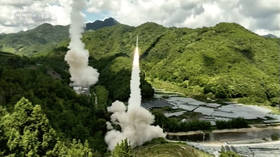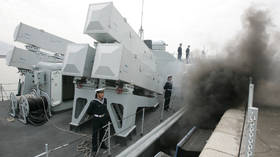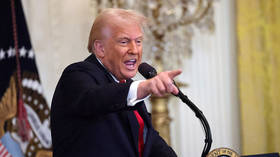Japan makes claim about Chinese missiles

Five Chinese ballistic missiles have landed in Japan’s exclusive economic zone, Defense Minister Nobuo Kishi claimed on Thursday. China had earlier scrapped a high-level diplomatic meeting with Japan, and fired a salvo of missiles into waters near Taiwan.
Kishi told Kyodo News that the incident marks the first time that a Chinese ballistic missile touched down in Japanese waters.
“This is a grave issue that concerns our country’s national security and the safety of the people,” Kishi said, adding that Tokyo had lodged a formal diplomatic protest with the Chinese government.
Japan’s exclusive economic zone is vast, and its extent is disputed by several nations, including China. The Japanese island of Yonaguni sits just 108 kilometers (67 miles) east of Taiwan, while Japan also claims sovereignty over the uninhabited Senkaku islands to Taiwan’s northeast, in an area of the East China Sea that overlaps with China’s own exclusive economic zone.
China announced earlier on Thursday that its military had conducted a long-range live-fire exercise in this area, with Chinese media reporting that the drills may have included Dongfeng DF-17 missiles. Tipped with hypersonic glider warheads and capable of striking targets up to 2,500 kilometers from launch, Chinese reporters described their incorporation into the drills as a demonstration that China could fully blockade Taiwan, which it considers part of its territory, if it wanted to.
The Taiwanese government stated that the missiles were launched into waters to the northeast and southeast of the island, and that Taipei had activated “relevant defense systems” in response.
China held large-scale military exercises in the days before and after US House Speaker Nancy Pelosi’s visit to Taiwan on Tuesday. Beijing claims sovereignty over Taiwan – a position that the US officially acknowledges – and argued that the visit by Pelosi, who is third in line to the US presidency, amounted to a near-official endorsement of Taiwanese independence.
Taiwan’s military countered the Chinese exercises with drills of its own.
Japan has not remained neutral in the showdown. Along with the rest of the G7 group, Tokyo signed a declaration on Wednesday condemning Beijing’s flexing of its military muscle. “There is no justification to use a visit as pretext for aggressive military activity in the Taiwan Strait,” the statement read, adding that Beijing’s “escalatory response risks increasing tensions and destabilizing the region.” Meanwhile, Japanese commenters speculated that China’s missile drills may be intended as a warning to their country too, considering the strategic locations of Japan’s westernmost islands and the Japanese government’s general pro-Western stance.
Beijing responded to Japan’s signing of the G7 statement by canceling a planned meeting between the Chinese and Japanese foreign ministers at the ongoing ASEAN summit in Cambodia. Chinese Foreign Ministry spokeswoman Hua Chunying said that China was “strongly displeased” with Japan’s “irresponsible remarks.”














